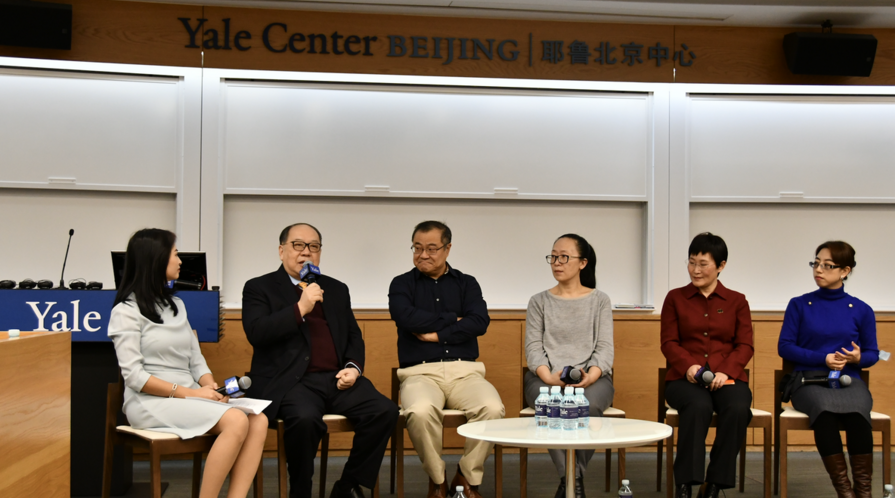Co-sponsored by Peking University's Institute for Global Health and Development and the Asia Health Policy Program
(Friday, September 13, 2024, 9:00am to 10:30am - Beijing time)
In this seminar, distinguished speakers will share their insights on the intersection of cutting-edge technology and healthcare policy. The event will feature short presentations followed by an in-depth discussion, exploring what it takes to bring innovative healthcare solutions from concept to implementation.
Representing different facets of the healthcare ecosystem, the presenters will address key topics such as the application and economic impact of surgical robotics, the delicate balance between pharmaceutical regulation and innovation, technology for population health and chronic disease control, and the development of digital solutions for aging populations.
This seminar offers a unique opportunity for attendees to gain valuable insights into the latest trends in healthcare technology and policy, and to engage in meaningful dialogue about shaping a healthier, more efficient future for all.

Dr. Lei Xiaoyan is the MOE Cheung-Kong Scholar Professor of Economics, and PKU Boya Distinguished Professor. She is currently the chair of the Academic Committee of the National School of Development, the director of the PKU Center for Healthy Aging and Development Studies, and deputy director of the MOE-PKU Center for Human Capital and National Policy Research, co-editor of the Journal of Economics of Aging, and a research fellow of IZA. Her research spans the areas of labor economics, health economics, and economics of aging. Her research has been published in Review of Economics and Statistics, American Economic Journal: Applied Economics, among others. Since 2020, she has consecutively been included on Elsevier’s List of Highly-cited Scholars in China. She received a Ph.D. in Economics from the University of California, Los Angeles in 2007.

Professor Min Yu graduated from the Department of Clinical Medicine at Zhejiang Medical University with a Bachelor of Medicine degree in 1988 and a Master's degree in Public Health from Beijing Medical University in 1998.
Professor Yu focuses on the prevention and control of chronic diseases and injuries. He has served as the chief editor or co-editor of five monographs and has published over 20 peer-reviewed papers. He has led one project under the National Key R&D Program’s “Precision Medicine Initiative” and three provincial or ministry-level projects. Professor Yu has received the third prize of the Science and Technology Award from the Chinese Preventive Medicine Association, the third prize of the Provincial Science and Technology Advancement Award, and the second prize of Provincial Medical and Health Science and Technology.

Dr. Beini Lyu's research interests are pharmacoepidemiology, clinical epidemiology of chronic diseases, real-world studies, and health technology assessment. Dr. Lyu’s work has been published in top medical journals such as the Lancet Regional Health-Americas, Diabetes Care, and the American Journal of Kidney Diseases. She served as PI of a research grant from the American Society of Diagnostic and Interventional Nephrology (ASDIN). She has received the Donn D 'Alessio Outstanding Student Award from the Department of Population Health at the University of Wisconsin, the American Heart Association Student Research Fellowship in Cardiovascular Disease, and the Chinese Government Award for Outstanding Self-Financed Student Abroad. Dr. Lyu received her M.D. from Peking University and her Ph.D. in epidemiology from the University of Wisconsin-Madison.

Dr. Jianan Yang's primary research fields are health economics and development economics, with specific interests in health policy reform, health behavior and healthcare demand, and pharmaceutical innovation. Her research papers have been published in leading international journals in development economics, such as the Journal of Development Economics. She has also served as an anonymous reviewer for renowned academic journals including the Journal of Public Economics, the Journal of Development Economics, and the Journal of Health Economics, among others. She earned her bachelor’s degrees in Economics and Mathematics from Renmin University of China in 2016, and her Ph.D. in Economics from the University of California, San Diego in 2022. Before joining Peking University, she was a postdoctoral fellow in the Asian Health Policy Program at Stanford University.

Dr. Yuhang Pan's research fields include environmental economics, health economics, and development economics, with a focus on using a causal inference approach to study the impact of environmental pollution, public policy, and climate change on health and social welfare. His works have been published in economics and scientific journals, such as Science, Nature Sustainability, and the Journal of Environmental Economics and Management. Dr. Pan obtained his undergraduate degree from Beijing Normal University in 2015 and his doctoral degree from the Hong Kong University of Science and Technology in 2021. Prior to joining Peking University, he worked as a postdoctoral researcher at the Faculty of Business and Economics at the University of Hong Kong.














